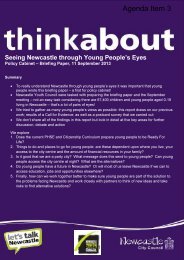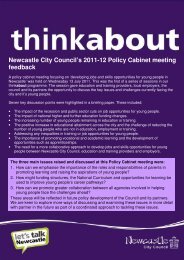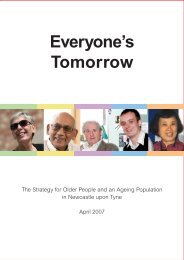NEWCASTLE'S MUSICAL HERITAGE AN INTRODUCTION By ...
NEWCASTLE'S MUSICAL HERITAGE AN INTRODUCTION By ...
NEWCASTLE'S MUSICAL HERITAGE AN INTRODUCTION By ...
You also want an ePaper? Increase the reach of your titles
YUMPU automatically turns print PDFs into web optimized ePapers that Google loves.
country. Amers died in 1936 and Godfrey in 1939. Amers had a first class<br />
musical background and a distinguished military career. It was natural in his<br />
youth that he should be attracted to the military style of bandsmanship as this<br />
kind of music was the Englishman’s staple diet; the average Englishman had not<br />
yet become accustomed to the modern symphony orchestra and the<br />
cacophonous modern music it played. Amers first took himself to Scarborough in<br />
1909 and after a season there, moved to Brighton. He conducted in Newcastle<br />
often enough but his contribution to the town’s musical culture was superficial.<br />
He returned to Brighton after the war but soon moved to Eastbourne where he<br />
remained for the rest of his career and created a series of music festivals that ran<br />
from 1923 –1939. In the same way as his rival in Bournemouth he created a<br />
centre of English music and attracted amongst others, Edward Elgar, Ethel<br />
Smyth, Gustav Holst, Granville Bantock, Roger Quilter, Balfour Gardiner, Percy<br />
Grainger, John Ireland, Vaughan-Williams and even the famous Russian<br />
composer, Alexander Glazounov. He spread his net even further and recruited<br />
the assistance of Hamilton Harty, Thomas Beecham, Malcolm Sargent, John<br />
Barbirolli and Albert Coates to conduct his concerts. He slowly educated his<br />
audiences by slipping in odd movements from symphonies between popular<br />
items until by the 1930s they were getting full-blown symphonic programmes. His<br />
death coincided with the end of an era in Eastbourne and the kind of music he<br />
had presented, and by 1939 music hating councillors were proposing to pull<br />
down the Winter Garden and build something useful like a country club, which<br />
everyone could enjoy!<br />
Why could Amers not have done this sort of thing in Whitley Bay. The simple<br />
answer is that Whitley Bay catered only for the locals and Scots factory workers<br />
and the Spanish City provided all their needs. At about this time there was a<br />
thriving musical culture in many of the leading spas around the country but none<br />
of the wealthier set came to the North East for the good of their health. To create<br />
a musical culture, in addition to commitment there is a need for an audience<br />
educated to listen to good music. Given the right opportunities Newcastle might<br />
have created such an audience but as we have seen from the Laing Art Gallery,<br />
the haggling over funds for the People’s Concerts and apparent lack of interest in<br />
having a purpose built concert hall for musical performances, the Council was not<br />
interested in Art or Culture in any form. It was not even interested in local<br />
musicians or music per se for that matter unless it served some subsidiary<br />
purpose. For example when a decision had to be made regarding music at the<br />
1929 North East Coast Exhibition, an event intended amongst other things to<br />
show off the regions achievements and boost local moral it turned to Capt Amers<br />
and his South East Coast musicians. A slap in the face for Newcastle<br />
professional musicians – or had the state of music making locally deteriorated<br />
that much by 1929. Perhaps not, but the signs were imminent and by the 1950s it<br />
had reached its lowest ebb. This generally coincided with a period of hardship<br />
and change on Tyneside. The city was perceived by many people as being a<br />
grey town and a cultural desert. The majority preferred to spend their hardearned<br />
cash on the cinema, beer and football and as a consequence Newcastle<br />
109

















